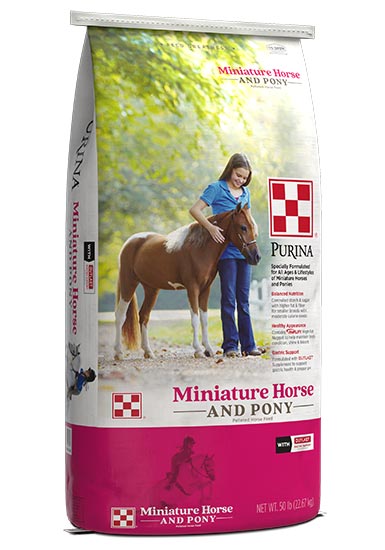
Equine
FeedPurina Miniature Horse & Pony
Pellet#20001758
Specifically formulated to meet the unique needs of miniature horses and ponies who tend to be more metabolically efficient than large horses, but still require the nutrition necessary for growth, gestation, lactation, breeding and competition.
Learn More
PRODUCT DETAIL
More >
Purina® Miniature Horse and Pony horse feed is specifically formulated to
meet the unique needs of miniature horses and ponies who tend to be more metabolically efficient than large horses, but still require the nutrition necessary for growth, gestation, lactation, breeding and competition.
GUARANTEED ANALYSIS
More >
Nutrient Min/Max Amount
Crude Protein MIN 13.50 %
Lysine MIN 0.80 %
Crude Fat MIN 4.50 %
Crude Fiber MAX 18.00 %
Acid Detergent Fiber (ADF) MAX 23.00 %
Neutral Detergent Fiber (NDF) MAX 39.00 %
Dietary Starch MAX 11.00 %
Sugars MAX 7.00 %
Calcium (Ca) MIN 0.80 %
Calcium (Ca) MAX 1.30 %
Phosphorus (P) MIN 0.65 %
Copper (Cu) MIN 75.00 PPM
Selenium (Se) MIN 0.60 PPM
Zinc (Zn) MIN 270.00 PPM
Vitamin A MIN 3000 IU/LB
Vitamin E MIN 125 IU/LB
LIST OF INGREDIENTS
More >
For specific ingredient listing for this product please refer to the feed tag affixed to the package in your region or contact us at 800-227-8941.
WARNING/CAUTION
More >
Store in a dry, well-ventilated area protected from rodents and insects. Do not feed moldy or insect-infested feed to animals as it may cause illness, performance loss or death.
DIRECTIONS FOR USE
More >
Best Results
Feeding rates will vary with size, age, temperament, health status, forage quality, climate and activity level. Feed at regular times - at least twice daily with three daily feedings preferred. Let horses feed in a natural position from troughs with large bottoms, placed at normal head height or lower. Do not feed free-choice. Prevent the rapid eating by the horse of any feedstuff.
Reduce and/or delay feeding a horse which is hot, excited or showing pain, has fever or diarrhea. Consult your veterinarian if any problems arise.
Always feed a minimum of 1.0 to 1.2 lbs per 100 lbs of body weight of good quality, clean hay or the equivalent in pasture.
Any feed changes should be made gradually over a period of 7 to 10 days. Changes in the rate of feeding should not exceed 1.0 lb per day for each horse.
Have plenty of clean, fresh water available at all times. Provide your horse with access to salt. Maintain an effective control program for internal parasites. Have the horse's teeth examined annually and consult your veterinarian on a regular basis.
Changing To
Make the feed change gradually over a period of 7 to 10 days.
Mix the new feed with the old, gradually increasing the amount of the new feed while decreasing an equal amount of the old.